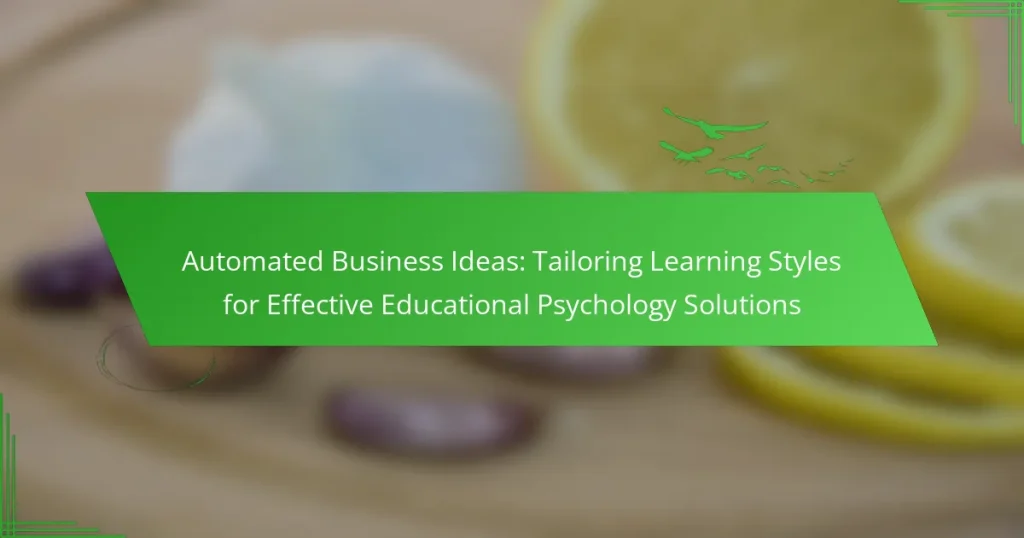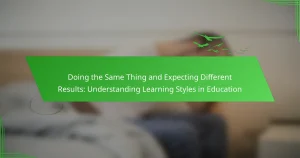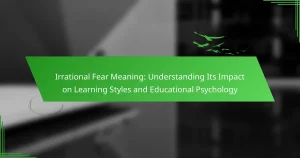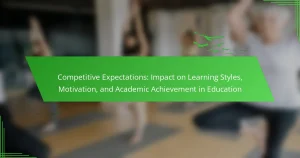Tailoring educational psychology solutions to diverse learning styles can significantly enhance engagement and retention. This article explores key principles of educational psychology, identifies common and rare learning styles, and discusses how automated business ideas can personalize learning experiences. It emphasizes the importance of technology in adapting content delivery and fostering continuous improvement through data-driven assessments and collaboration among educators.

What are the foundational principles of educational psychology?
The foundational principles of educational psychology focus on understanding how individuals learn. Key principles include the recognition of diverse learning styles, the importance of motivation, and the impact of social and cultural contexts on learning. Tailoring educational approaches to accommodate these factors enhances learning effectiveness. Understanding cognitive development is also crucial as it informs instructional strategies. Additionally, applying assessment and feedback mechanisms supports continuous improvement in educational practices.
How do learning styles influence educational outcomes?
Learning styles significantly influence educational outcomes by shaping how students engage with content. Tailoring educational psychology solutions to match individual learning preferences enhances retention and comprehension. For instance, visual learners benefit from diagrams, while auditory learners excel with lectures. This customization leads to improved academic performance and motivation. Research indicates that aligning teaching methods with learning styles can increase student engagement by up to 30%. By integrating automated business ideas, educators can efficiently adapt resources to meet diverse learning needs, fostering a more effective educational environment.
What are the key theories in educational psychology?
Key theories in educational psychology include behaviourism, constructivism, and humanism. Behaviourism focuses on observable behaviours and reinforcement. Constructivism emphasizes active learning and knowledge construction. Humanism prioritises personal growth and self-actualisation. Each theory provides unique insights for tailoring effective educational solutions.

What are the most common learning styles?
The most common learning styles include visual, auditory, and kinesthetic. Visual learners benefit from diagrams and charts, auditory learners excel with lectures and discussions, while kinesthetic learners prefer hands-on activities. Tailoring educational psychology solutions to these styles enhances engagement and retention.
How does visual learning impact information retention?
Visual learning significantly enhances information retention by engaging multiple senses and fostering deeper understanding. Studies show that individuals retain up to 65% of information when visual aids are utilized, compared to just 10% with auditory methods. This approach supports diverse learning styles, making it a unique attribute of effective educational psychology solutions. Visual stimuli create associations, simplifying complex concepts and improving recall. As a result, tailoring learning experiences to include visual elements can lead to more effective educational outcomes.
What role does auditory learning play in comprehension?
Auditory learning enhances comprehension by allowing individuals to absorb information through listening. This learning style supports retention and understanding, particularly in educational settings. Auditory learners benefit from lectures, discussions, and audio materials, which facilitate deeper cognitive processing. Research indicates that incorporating auditory elements can improve engagement and knowledge retention by up to 60%. Tailoring educational approaches to include auditory learning strategies can significantly enhance overall effectiveness in educational psychology solutions.
How can kinesthetic learning enhance engagement?
Kinesthetic learning enhances engagement by involving physical activity, which boosts retention and motivation. This learning style caters to individuals who thrive on hands-on experiences, making education more interactive. Studies show that incorporating movement in lessons can increase focus and improve memory recall. This unique attribute of kinesthetic learning fosters a deeper connection with the material, resulting in more effective educational psychology solutions.
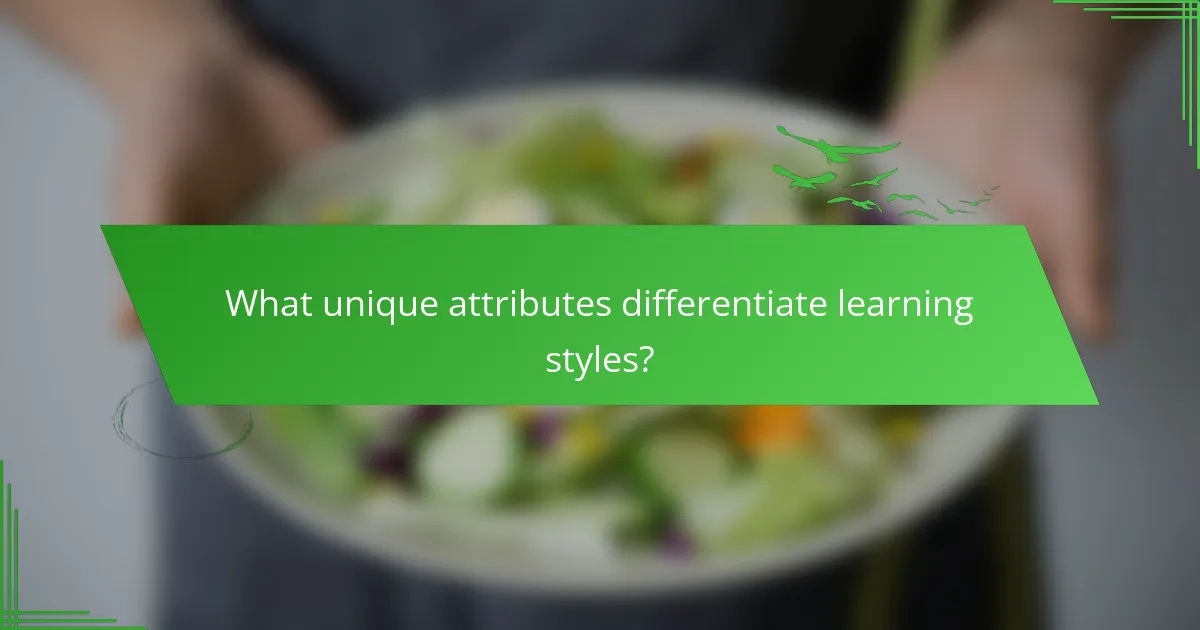
What unique attributes differentiate learning styles?
Unique attributes that differentiate learning styles include sensory preferences, cognitive processes, and motivation levels. Sensory preferences determine how individuals absorb information, such as visual, auditory, or kinesthetic methods. Cognitive processes involve how learners think and process information, influencing their problem-solving approaches. Motivation levels reflect intrinsic or extrinsic factors that drive engagement. Tailoring educational psychology solutions to these unique attributes enhances learning effectiveness and retention.
How do cultural factors affect learning preferences?
Cultural factors significantly influence learning preferences by shaping individual approaches to education. For instance, collectivist cultures may prioritise group learning, while individualistic cultures might emphasise personal achievement. These preferences affect the design of educational psychology solutions, tailoring methods to align with diverse cultural backgrounds. Understanding these variations enhances the effectiveness of automated business ideas in educational settings.
What is the significance of adaptability in learning styles?
Adaptability in learning styles is crucial for optimizing educational outcomes. It allows educators to customize teaching methods to meet diverse learner needs. This personalization enhances engagement, retention, and application of knowledge. Research indicates that adaptable learning approaches can improve student performance by up to 30%. By recognizing individual differences, educators can foster a more inclusive learning environment.
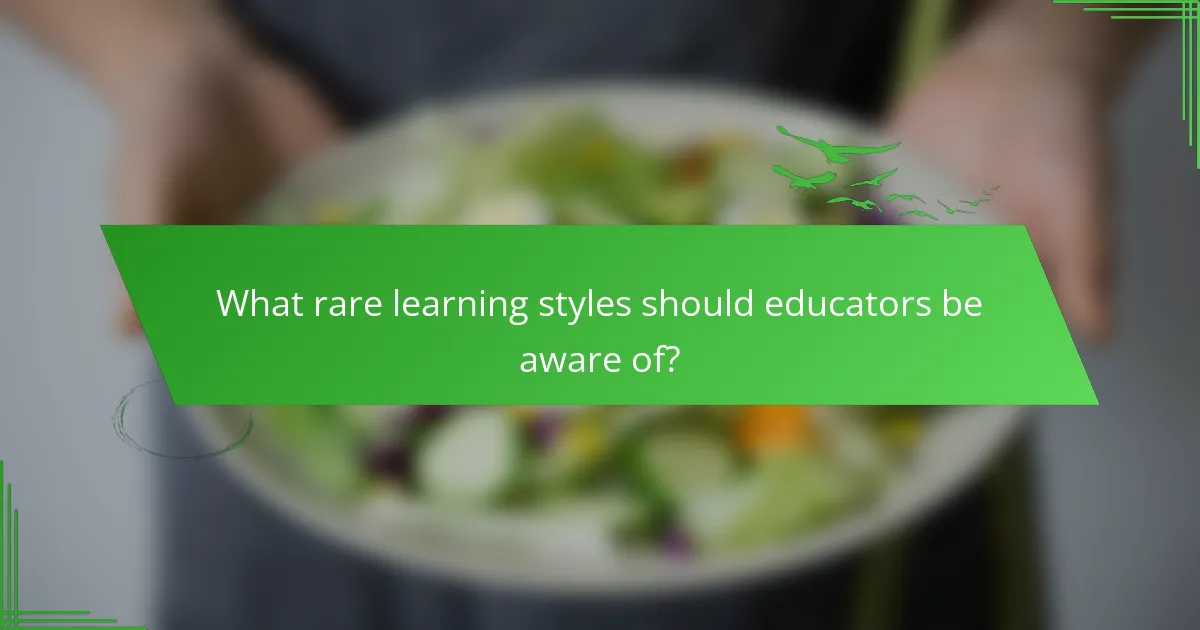
What rare learning styles should educators be aware of?
Educators should be aware of rare learning styles such as kinesthetic, intrapersonal, and musical. Kinesthetic learners grasp concepts through physical activity, enhancing retention and engagement. Intrapersonal learners excel in self-reflection and introspection, benefiting from personalized learning environments. Musical learners respond well to rhythm and sound, using music as a tool for memorization and understanding. Recognizing these styles allows for tailored educational psychology solutions that enhance learning outcomes.
How does experiential learning differ from traditional methods?
Experiential learning emphasizes active participation and real-world application, while traditional methods focus on passive absorption of information. Experiential learning fosters critical thinking and problem-solving skills through hands-on experiences, which enhances retention and engagement. In contrast, traditional methods often rely on lectures and rote memorization, limiting practical application. This distinction highlights the unique benefits of experiential learning in educational psychology solutions, promoting tailored approaches to diverse learning styles.
What are the implications of holistic learning approaches?
Holistic learning approaches enhance educational psychology solutions by fostering personalized learning experiences. These methods consider diverse learning styles, promoting engagement and retention. As a result, they can lead to improved academic performance and greater learner satisfaction. Tailoring educational strategies to individual needs addresses unique attributes of learners, such as motivation and cognitive preferences, ultimately creating a more effective learning environment.

How can automated business ideas cater to diverse learning styles?
Automated business ideas can effectively cater to diverse learning styles by providing personalized educational experiences. These solutions utilize technology to adapt content delivery based on individual preferences, such as visual, auditory, or kinesthetic learning. For instance, platforms can offer video tutorials, interactive simulations, or audio lectures, ensuring engagement across different learner types. This tailored approach enhances retention and understanding, making education more accessible and effective.
What technologies support personalized learning experiences?
Technologies that support personalized learning experiences include adaptive learning platforms, learning management systems, artificial intelligence, and data analytics tools. These technologies tailor educational content to individual learning styles and paces, enhancing engagement and retention. For example, adaptive learning platforms adjust difficulty based on student performance, while AI provides personalized feedback and recommendations. Data analytics tools track progress and identify areas for improvement, allowing educators to customize instruction effectively.
How can data analytics enhance understanding of learner preferences?
Data analytics enhances understanding of learner preferences by providing insights into individual learning styles and behaviours. By analyzing data from assessments, engagement metrics, and feedback, educators can identify trends and tailor educational psychology solutions to meet diverse needs. This personalized approach increases learner satisfaction and effectiveness. For instance, analytics can reveal which formats (videos, readings, interactive activities) resonate most with students, allowing for optimized content delivery. As a result, educational strategies become more adaptive, fostering better learning outcomes.

What best practices should be implemented for effective educational solutions?
To implement effective educational solutions, focus on personalized learning experiences. Tailoring educational approaches to individual learning styles enhances engagement and retention. Utilize data-driven assessments to identify students’ unique attributes, such as their preferred learning modalities. Incorporate technology to facilitate adaptive learning environments, allowing for real-time feedback and adjustments. Foster collaboration among educators to share best practices and insights, ensuring continuous improvement in educational strategies.
How can educators avoid common pitfalls in applying learning styles?
Educators can avoid common pitfalls in applying learning styles by focusing on evidence-based practices and flexible teaching methods. Emphasizing a blended approach that incorporates various instructional strategies helps address diverse learner needs effectively. Regular assessment of student engagement and comprehension can guide adjustments in teaching methods, ensuring they align with actual learning outcomes rather than rigid adherence to learning styles. Additionally, fostering a growth mindset encourages students to adapt their learning strategies, enhancing overall educational effectiveness.
What strategies can optimize learning outcomes for all students?
Tailoring learning styles through automated business ideas enhances educational psychology solutions, optimizing outcomes for all students. Strategies include personalized learning pathways, adaptive technology, and data-driven insights. Personalized pathways cater to individual strengths, while adaptive technology adjusts content delivery based on real-time feedback. Data-driven insights help educators identify areas for improvement, ensuring targeted support for diverse learning needs.
How can feedback mechanisms improve educational psychology applications?
Feedback mechanisms enhance educational psychology applications by providing real-time insights into student learning preferences. These mechanisms allow for personalized learning experiences, aligning teaching methods with individual cognitive styles. As a result, educators can adapt their strategies to improve student engagement and retention. Continuous feedback loops also foster a responsive learning environment, enabling adjustments based on student performance and emotional responses. This adaptability is crucial for optimizing educational outcomes and ensuring that psychological principles are effectively applied in diverse learning contexts.
